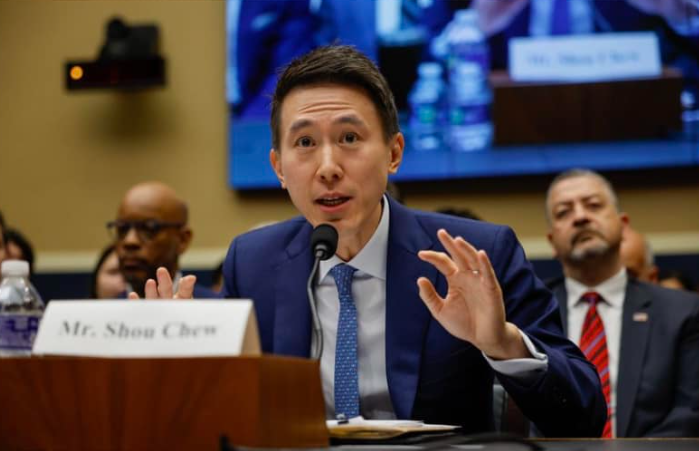- Insider reveals Biden administration admits to having no legal authority to prohibit the popular app without Congress’s intervention.
- TikTok CEO’s attempt to dispel National Security fears backfires in Congress: Is this the end of the popular app in America?
Shou Zi Chew, the CEO of TikTok, made a valiant effort to alleviate the increasing national security apprehensions revolving around the Chinese-owned social media app. However, his attempt was met with overt antagonism on Thursday during his initial appearance before Congress, which lasted five hours. The hostile session highlighted the uncertain and risky future of the popular app in the United States.
Lawmakers across party lines attempted to associate Shou Zi Chew with the Chinese Communist Party, repeatedly interrupting him and accusing him of being “evasive.” Despite his assurance of protecting the data of American users and safeguarding TikTok from foreign interference, lawmakers unfoundedly condemned TikTok as a tool of the Chinese government while simultaneously showing that they had little understanding of how the app truly works.
Cathy McMorris Rodgers, the Republican chair of the House Energy and Commerce Committee, claimed that “TikTok is a weapon by the Chinese Communist Party to spy on you, manipulate what you see, and exploit for future generations,” adding that she favored a complete ban of the app.
By making an appearance, Chew further entangled TikTok into a geopolitical conflict between two significant economic powers, with increasing support for a prohibition of the app among lawmakers and the American public.
The Biden administration has urged the Chinese proprietors of TikTok to dispose of their stakes in the company. However, the company has resisted divestment, and senior administration officials do not believe they possess the legal jurisdiction to prohibit TikTok without Congress’s involvement, as per an anonymous source familiar with internal government conversations.
Shortly before Chew’s testimony, the Beijing government strongly opposed any enforced divestiture of TikTok. Such a decision would “gravely harm the confidence of investors from all around the world, including China,” stated Commerce Ministry spokesperson Shu Jueting.
Despite this, the Biden administration has limited options to restrict TikTok, and any attempt is likely to face constitutional and legal challenges.
As per William Reinsch, a former Commerce Department official, the emergency economic authority that President Biden could use to enforce a ban on TikTok is not allowed to be utilized to curb the circulation of information. U.S. Judge Carl J. Nichols had cited this clause to thwart President Donald Trump’s efforts to prohibit TikTok in 2020. Moreover, a ban on the app would likely face First Amendment disputes concerning freedom of speech.
According to William Reinsch, who is presently associated with the Center for Strategic and International Studies, the law dictates that any action President Biden takes should not obstruct the transmission of information. The aim was to ensure that the United States did not impede the free exchange of information.
Spokespersons for the White House and Treasury Department have refused to comment on the matter.
Recently, the White House backed a proposed legislation that would empower the government to exercise greater control over foreign-owned apps, indicating that the legal obstacles ahead are difficult to navigate. In 2020, when Trump tried to ban TikTok, federal judges ruled that the administration had not provided enough proof to demonstrate that the national security risks outweighed the harm a ban would cause Americans’ First Amendment rights.
During the hearing, lawmakers did not present any fresh evidence to support their baseless allegations that the Chinese government exploited TikTok to obtain access to user data or propagate government propaganda. Despite this, lawmakers displayed a rare level of focus when it came to apprehensions about the app’s potential threat to national security.

